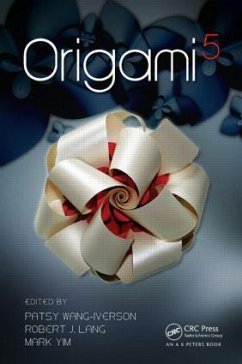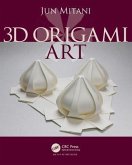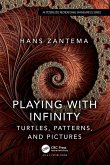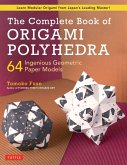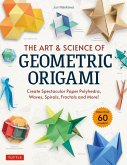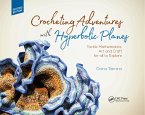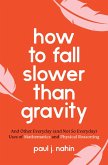Origami 5
Fifth International Meeting of Origami Science, Mathematics, and Education
Herausgeber: Wang-Iverson, Patsy; Yim, Mark; Lang, Robert J
Origami 5
Fifth International Meeting of Origami Science, Mathematics, and Education
Herausgeber: Wang-Iverson, Patsy; Yim, Mark; Lang, Robert J
- Broschiertes Buch
- Merkliste
- Auf die Merkliste
- Bewerten Bewerten
- Teilen
- Produkt teilen
- Produkterinnerung
- Produkterinnerung
"While many individuals have discovered discrete connections among origami, mathematics, science, technology, and education during the twentieth century, the field really took off when previously isolated individuals began to make stronger connections with each other, exploring the links between origami and "the outside world." This volume brings together an unprecedented number of researchers who discuss topics ranging from mathematics to technology to educational uses of origami to fine art to computerprograms for the design of origami"--
![3D Origami Art 3D Origami Art]() Jun Mitani (Japan University of Tsukuba)3D Origami Art58,99 €
Jun Mitani (Japan University of Tsukuba)3D Origami Art58,99 €![Playing with Infinity Playing with Infinity]() Hans ZantemaPlaying with Infinity37,99 €
Hans ZantemaPlaying with Infinity37,99 €![The Complete Book of Origami Polyhedra The Complete Book of Origami Polyhedra]() Tomoko FuseThe Complete Book of Origami Polyhedra14,99 €
Tomoko FuseThe Complete Book of Origami Polyhedra14,99 €![The Art & Science of Geometric Origami The Art & Science of Geometric Origami]() Jun MaekawaThe Art & Science of Geometric Origami17,99 €
Jun MaekawaThe Art & Science of Geometric Origami17,99 €![Crafting Conundrums Crafting Conundrums]() Ellie BakerCrafting Conundrums57,99 €
Ellie BakerCrafting Conundrums57,99 €![Crocheting Adventures with Hyperbolic Planes Crocheting Adventures with Hyperbolic Planes]() Daina TaiminaCrocheting Adventures with Hyperbolic Planes28,99 €
Daina TaiminaCrocheting Adventures with Hyperbolic Planes28,99 €![How to Fall Slower Than Gravity How to Fall Slower Than Gravity]() Paul NahinHow to Fall Slower Than Gravity17,99 €
Paul NahinHow to Fall Slower Than Gravity17,99 €-
-
-
- Produktdetails
- AK Peters/CRC Recreational Mathematics Series
- Verlag: Taylor & Francis Inc
- Seitenzahl: 668
- Erscheinungstermin: 21. Juni 2011
- Englisch
- Abmessung: 236mm x 154mm x 35mm
- Gewicht: 962g
- ISBN-13: 9781568817149
- ISBN-10: 1568817142
- Artikelnr.: 32420567
- AK Peters/CRC Recreational Mathematics Series
- Verlag: Taylor & Francis Inc
- Seitenzahl: 668
- Erscheinungstermin: 21. Juni 2011
- Englisch
- Abmessung: 236mm x 154mm x 35mm
- Gewicht: 962g
- ISBN-13: 9781568817149
- ISBN-10: 1568817142
- Artikelnr.: 32420567
West before InterfusionDeictic Properties of Origami Technical Terms and
Translatability. Betsy Ross Revisited: General Fold and One-Cut Regular and
Star Polygons. Reconstructing David Huffman's Legacy in Curved-Crease
Folding. Simulation of Nonzero Gaussian Curvature in Origami by
Curved-Crease Couplets. Compression and Rotational Limitations of Curved
Corrugations. Polygon Symmetry Systems. New Collaboration on Modular
Origami and LED. Using the Snapology Technique to Teach Convex Polyhedra. A
Systematic Approach to Twirl Design. Oribotics: The Future Unfolds. Origami
in Education: Origametria and the van Hiele Theory of Teaching Geometry.
Student-Teachers Introduce Origami in Kindergarten and Primary Schools.
Narratives of Success: Teaching Origami in Low-Income Urban Communities.
Origami and Spatial Thinking of College-Age Students. Close Observation and
Reverse Engineering of Origami Models. Origami and Learning Mathematics.
Hands-On Geometry with Origami. .My Favorite Origamics Lessons on the
Volume of Solids. Origami Science, Engineering, and Technology:
Rigid-Foldable Thick Origami. Folding a Patterned Cylinder by Rigid
Origami. The Origami Crash Box. Origami Folding: A Structural Engineering
Approach. Designing Technical Tessellations. A Simulator for
Origami-Inspired Self-Reconfigurable Robots. A CAD System for Diagramming
Origami with Prediction of Folding Processes. Development of an Intuitive
Algorithm for Diagramming and 3D Animated. Hands-Free Microscale Origami.
Foldable Parylene Origami Sheets Covered with Cells: Toward
Applications...Mathematics of Origami: Introduction to the Study of Tape
Knots. Universal Hinge Patterns for Folding Orthogonal Shapes. A General
Method of Drawing Biplanar Crease Patterns. A Design Method for
Axisymmetric Curved Origami with Triangular Prism Protrusions. Folding Any
Orthogonal Maze. Every Spider Web Has a Simple Flat Twist Tessellation.
Flat-Unfoldability and Woven Origami Tessellations. Degenerative
Coordinates in 22.5° Grid System. Two Folding Constructions. Variations on
a Theorem of Haga. Precise Division of Rectangular Paper into an Odd Number
of Equal Parts. The Speed of Origami Constructions Versus Other
Construction Tools. A Note on Operations of Spherical Origami Construction.
Origami Alignments and Constructions in the Hyperbolic Plane. A
Combinatorial Definition of 3D Flat-Folding. Stamp Foldings with a Given
Mountain-Valley Assignment. Flat Vertex Fold Sequences. Circle Packing for
Origami Design Is Hard.
West before InterfusionDeictic Properties of Origami Technical Terms and
Translatability. Betsy Ross Revisited: General Fold and One-Cut Regular and
Star Polygons. Reconstructing David Huffman's Legacy in Curved-Crease
Folding. Simulation of Nonzero Gaussian Curvature in Origami by
Curved-Crease Couplets. Compression and Rotational Limitations of Curved
Corrugations. Polygon Symmetry Systems. New Collaboration on Modular
Origami and LED. Using the Snapology Technique to Teach Convex Polyhedra. A
Systematic Approach to Twirl Design. Oribotics: The Future Unfolds. Origami
in Education: Origametria and the van Hiele Theory of Teaching Geometry.
Student-Teachers Introduce Origami in Kindergarten and Primary Schools.
Narratives of Success: Teaching Origami in Low-Income Urban Communities.
Origami and Spatial Thinking of College-Age Students. Close Observation and
Reverse Engineering of Origami Models. Origami and Learning Mathematics.
Hands-On Geometry with Origami. .My Favorite Origamics Lessons on the
Volume of Solids. Origami Science, Engineering, and Technology:
Rigid-Foldable Thick Origami. Folding a Patterned Cylinder by Rigid
Origami. The Origami Crash Box. Origami Folding: A Structural Engineering
Approach. Designing Technical Tessellations. A Simulator for
Origami-Inspired Self-Reconfigurable Robots. A CAD System for Diagramming
Origami with Prediction of Folding Processes. Development of an Intuitive
Algorithm for Diagramming and 3D Animated. Hands-Free Microscale Origami.
Foldable Parylene Origami Sheets Covered with Cells: Toward
Applications...Mathematics of Origami: Introduction to the Study of Tape
Knots. Universal Hinge Patterns for Folding Orthogonal Shapes. A General
Method of Drawing Biplanar Crease Patterns. A Design Method for
Axisymmetric Curved Origami with Triangular Prism Protrusions. Folding Any
Orthogonal Maze. Every Spider Web Has a Simple Flat Twist Tessellation.
Flat-Unfoldability and Woven Origami Tessellations. Degenerative
Coordinates in 22.5° Grid System. Two Folding Constructions. Variations on
a Theorem of Haga. Precise Division of Rectangular Paper into an Odd Number
of Equal Parts. The Speed of Origami Constructions Versus Other
Construction Tools. A Note on Operations of Spherical Origami Construction.
Origami Alignments and Constructions in the Hyperbolic Plane. A
Combinatorial Definition of 3D Flat-Folding. Stamp Foldings with a Given
Mountain-Valley Assignment. Flat Vertex Fold Sequences. Circle Packing for
Origami Design Is Hard.

